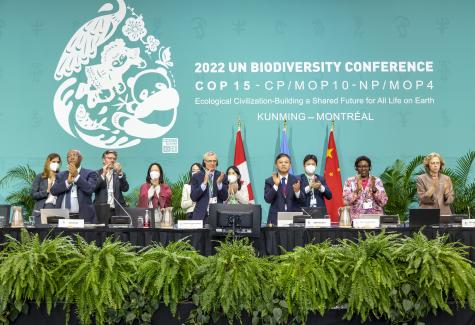COP15 Biodiversity Summit

➡️ COP15 - UN Biodiversity Summit, Montreal
December 7-19, 2022 saw world leaders come together for COP15 in Montreal to address rapidly declining biodiversity and loss of nature, now termed the biodiversity crisis.
Find an extensive platform on ➡️ COP15 including essential resources, must read articles, and video news.
Was COP15 a Success?
Giving us reason for hope, this global summit produced a number of encouraging outcomes. In a historic win for nature, 196 of the world's nations have agreed to protect our planets biodiversity. 30% of all land and water by 2030 – or 30 by 30. Some are comparing the deal with the landmark Paris Agreement. Others noted this as a step in the right direction, but with much more work to be done.
Further cause for celebration was the pledge to commit a minimum of $200 billion annually to biodiversity related funding. Much needed investment to ensure the protection and restoration of our fragile ecosystems.
Developing countries fought hard to secure a biodiversity fund of $30 billion a year which will be will be contributed by developed countries - those most responsible for environmental damage.

A review of subsides will also take place which aims to remove $500 billion of funding from industries deemed harmful to nature such as Big Oil. One further takeaway was the commitment to reduce the use of harmful pesticides.
Many were surprised by the spirited involvement from China, who were due to host originally in Kunming, but were replaced due to Covid-19 restrictions. They played an important part in championing for nature and helped to bridge the differences between developed and developing nations.
The event wasn’t all smooth sailing. In a disagreement over financing, delegates from 70 countries walked out of the negotiations - predominantly from Africa, South America, and Asia - they argued that developed countries wanted to set ambitious targets, but not offer sufficient funding to back them. It took two whole weeks of negotiations for all nations to agree.
While some NGOs have hailed COP15 a huge success, others such as Greenpeace have said that the agreement leaves huge gaps for greenwashing, labelled it as weak, and too little too late: This deal may take the foot off the gas, but if we do not press the break, we will be sure to reap the consequences of inaction.

Better World Info's Afterthoughts on COP15
The encouraging outcomes of this summit finally recognise the importance of preserving our natural world. If the funding is secured, used effectively, and all nations commit to their pledges, we believe this could be the breakthrough that nature has been waiting for.
On the other hand, COP15 received a noticeable lack of media attention, political leadership, and involvement from celebrity activists who are normally outspoken, and raise the profile of such events. This nature COP seemed to play second fiddle to the UN climate change summit COP27 in Sharm El Sheikh.
We cannot solve the climate crisis, without also solving our nature crisis. The two go hand in hand. We must work together to ensure that both issues are addressed with equal importance and urgency.
As the executive director of the UNEP Inger Andersen said, ‘Now is our chance to shore up and strengthen the web of life, so it can carry the full weight of generations to come.’
Author: Rachael Mellor, 22.12.22 licensed under CC BY-ND 4.0 (Updated 06.11.24)
For further reading on the COP15 see below ⬇️
Info on COP15 Biodiversity Summit
- COP15 - General Info[15]
- Articles on COP15[172]
- Videos on COP15[16]